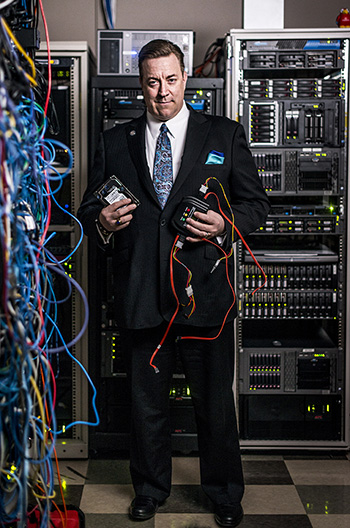Mark St. Peter Managing Director and CEO
Computing Source, Southfield
Computing Source, Southfield
Listen to the Champions of the New Economy Interview
 Standard MP3 Podcast: Download
Standard MP3 Podcast: Download
WHY HE’S A CHAMPION OF THE NEW ECONOMY:
Anyone fortunate to do business with both sides in a given activity or transaction stands to succeed. That’s the case for Mark St. Peter, managing director and CEO of Computing Source in Southfield, which specializes in electronic discovery, computer forensics, and imaging and scanning. But St. Peter’s road to success has been anything but a cakewalk. For Detroit’s Chapter 9 bankruptcy, St. Peter is providing document services for various parties involved in the case and is video-recording the nearly daily procedures on behalf of the federal court. “I started the business in 1981, but I was diagnosed with lymphatic cancer in 1996, and then it came back in 2001 and I almost died,” St. Peter says. “We slowed the business down the second time, and when everything was clear with my health, we brought the business back.” Working with dozens of clients — many of whom need near-immediate access to thousands of legal documents — is a complicated and fast-paced business. Today, Computing Source has 135 employees, and 2014 revenue is expected to be $10 million.
What’s your involvement in Detroit’s Chapter 9 bankruptcy?
We manage both sides, meaning the creditors and the city. It has been a busy schedule. We’re doing trial presentations for most of the creditors, and doing a lot of print work and binding work for 20-plus (city) attorneys. When there’s a hearing, we have to manage a lot of people in a short period of time. Fortunately, we have a store in the Penobscot Building (Computing Express) and a production facility in the Ford Building. We just developed a new logo that spells out what we do — all in one legal technology. We’ve really perfected it in terms of being full-service, including electronic discovery, computer forensics, copy/scan/print services, hosted document review, contract attorney staffing, expert testimony, and trial technology services, and we produce demonstrative evidence and trial boards. In one case, we handled a product liability case against a Japanese manufacturer. We worked with Jaffe Raitt, (a law firm) in Southfield. Half of the documents were in English, and the other half in Japanese. Overall, it was around 3.5 million documents over four years, including 300 depositions. It was a big deal.
How do you manage the internal workload?
We have two ways. The head of each department is the best and brightest in their field. Erik Schwartz, for instance, does our video work, and he was specifically requested by the parties and staff from the federal court (to record Detroit’s bankruptcy proceeding). Tim Smith is our general manager. He was corporate counsel for two different companies for several years. He understands, from an attorney’s perspective, what’s involved in making sure everything flows smoothly. The No. 1 request is seamless transition. If we have an order for 100 exhibit documents from a trial we can get those printed right away, or we can produce a trial board very quickly. But the customer never sees that. They have one point of contact in terms of our account executives, and we take care of everything behind the scenes. Tim manages all of the interactions when a job crosses from one department to another. If an account executive gets a request for something outside of their quadrant, they go to Tim and he coordinates everything.
What’s your growth strategy?
It’s very Midwest. We have offices in Detroit, Southfield, Birmingham, Ann Arbor, Grand Rapids, Chicago, and Indianapolis. Given what happened in my life, I have no interest in running around the country. Next, we’re going into Cleveland, then Pittsburgh. If I can’t drive there (from Detroit), I don’t want to have an office there. Each office is a little different. In Chicago, we started in the print sector, and then everything else came online. In Indianapolis, we do consulting, e-discovery, computer forensics, and expert services, and then down the road we hope to get a print job. Each city has it own lead service, and we look to expand from there. We may have a far west office at some point. My retirement plan is: “Aloha, Computing Source, Mark speaking, how can I help you?” We’re also looking at potentially expanding into Canada. I see Toronto as part of our Midwest footprint.
How has technology improved your business?
The demand for our services is such that our company operates 24/7. Technology provides me with daily financial reports, daily production reports, weekly reports, and monthly reports. It’s a sophisticated information management system, and I can see it all on my smartphone. We also stand out in the field. Most of our competitors are legal people who got into computers, while we’re a bunch of computer people that learned the legal industry. We’re in the process of acquiring a company that does financial printing, so that’s another example of technology that will help us.












